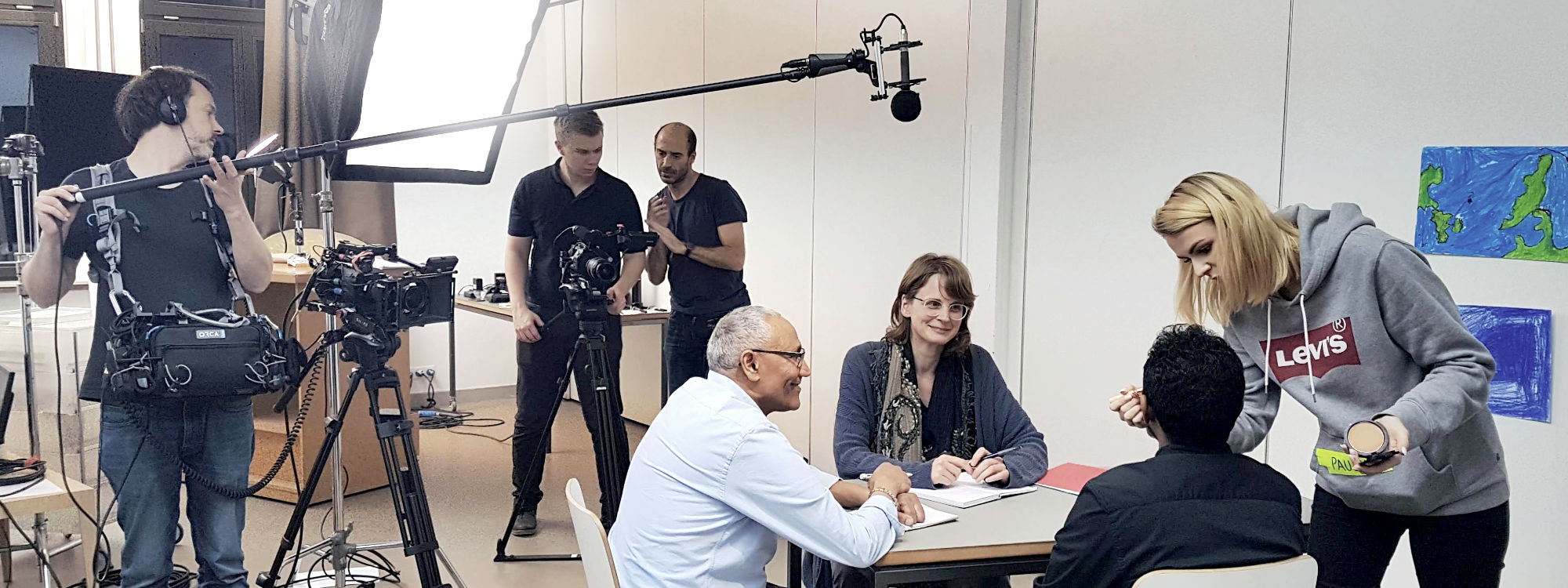
Project background
The increasing number of refugees in Germany has led to an enormous increase in the demand for community interpreting in social work in order to be able to provide adequate consulting and care for this target group. However, there are no uniform standards yet for the qualification of community interpreters in this field of work. As a consequence, community interpreters with varying qualification levels are used in social work. Often persons with no qualification in community interpreting are requested to assist. However, community interpreting, in particular in the field of social consulting and care for third-country nationals, is an enormous challenge. Community interpreters often work under great time pressure, sometimes with very stressed and needy clients and for low payment.
Existing qualification measures in Germany range between workshops running for half a day on the one hand and one-year full time trainings or two-year Master programmes on the other hand. In addition, the designations given to the people with such different qualifications are rather diffuse: volunteer interpreters, refugee pilots, refugee tutors, community interpreters, integration pilots, integration mentors, intercultural tutors, cultural interpreters, cultural pilots, cultural mediators, language pilots, language mediators, language and integration mediators, language and cultural mediators – to name just a few.
As a result, this enormous diversity poses a problem for the institutions and parties integrating community interpreting into social work with refugees. In such a complex area without any uniform quality standards, the competences of people qualified in such different ways are difficult to assess for social agencies, for example. Vice versa, this large but hardly structured diversity of offers leads to uncertainty amongst those wishing to qualify in community interpreting: on which basis can they choose a suitable training course which enjoys recognition and opens up employment opportunities for them? Last not least, the communication between the refugees and the various players in social and administrative institutions – and thus the quality of social services itself – suffers under these conditions.
For the above reasons a consolidation and clear definition of this professional field is much needed. ZwischenSprachen would like to contribute to that by developing and publishing quality standards for the qualification of community interpreters in social work with refugees based on empirical data and through scientific methods.
Project duration
07/2016-06/2018
Structure of the project
The project’s objective was to develop and disseminate scientifically based quality standards for the qualification of community interpreters working in social consulting and care for refugees.
The research project was subdivided into 4 modules:
Module 1 – Actual state analysis
Systematic research on available qualifications for community interpreters in Germany and abroad
To create high and at the same time efficient quality standards, first available findings and approaches were systematically researched and analysed. Existing evidence and quality requirements from literature was systematically assessed at a national and international level (English-speaking countries) and existing qualification programmes that have already been evaluated would undergo detailed analysis.
Module 2 – Needs assessment
Qualitative survey with the involved parties conducted as focus groups and one-to-one interviews
Two forms of interviews were used in the project to systematically assess the qualification needs as they are perceived by those involved in social work with refugees.
1. Focus groups (8-12 persons of the same target group; 2-3 hours)
Eleven focus groups with the following target groups and the regional distribution listed below were conducted:
North Rhine-Westphalia (Professionals in social work)
- Volunteer helpers
- Third-country nationals (Arabic-speaking persons)
- Volunteer community interpreters
- Professional, low qualified community interpreters
- Professional, certified language and integration mediators (Sprach- und IntegrationsmittlerInnen)
Hamburg (Professionals in social work)
- Volunteer helpers
- Third-country nationals (Dari-speaking persons)
- Volunteer community interpreters
- Professional, low qualified community interpreters
2. One-to-one interviews
As a second form of questioning 26 one-to-one interviews were carried out:
- Six interviews with third-country nationals (from North Rhine-Westphalia with Tigrinya, Kurdish or Arabic as a first language)
- Six interviews with third-country nationals (from Hamburg with Tigrinya, Kurdish or Arabic as a first language)
- Six interviews with heads and executives of the relevant institutions (central reception facilities, authorities etc.)
- Eight interviews with experts (amongst others from educational institutions and from science)
Module 3 – Consensus procedure
Carrying out of a consensus procedure to determine quality standards for the qualification of community interpreters
The data collected in Modules 1 and 2 was the basis for the consensus procedure at the end of which the quality standards should be determined. While the preparation of data in the form of a consensus document was carried out by the project team at the University Medical Center Hamburg-Eppendorf, experts carried out the following work steps developing the quality standards. The last step was a two-day consensus meeting in Hamburg.
Module 4 – Dissemination
Publication of the project results in the form of a publicly accessible final brochure, this project website as a well as as an international public conference in Hamburg.
The project received professional assistance from an interdisciplinary Advisory Board.